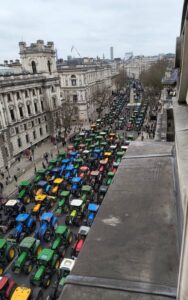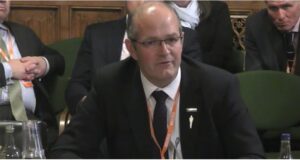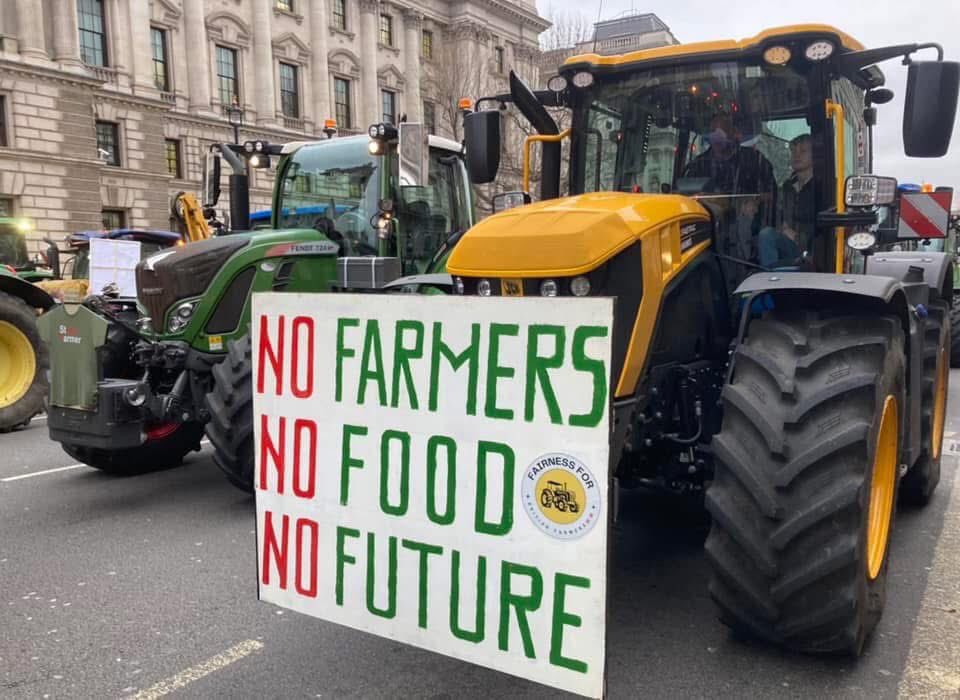 An estimated 600 tractors, at least, descended on Westminster on Wednesday in a hugely impressive protest against the Autumn Budget’s impact on farming.
An estimated 600 tractors, at least, descended on Westminster on Wednesday in a hugely impressive protest against the Autumn Budget’s impact on farming.
The organisers, including Save British Farming (SBF) and Kent Fairness for Farmers, want the government to ditch reforms to Agricultural Property Relief (APR) that will impose 20% inheritance tax on farm businesses valued over £1m from April 2026. Many farmers feel they would be unable tio afford this, even with other allowances taking the threshold up to £3m in some cases, and it will force them to sell or break up the farm.
Other grievances include planned tax hikes on double-cab pickups and fertiliser, the accelerated withdrawal of Basic Payments in England, and trade policies they say are undermining high UK standards.
The London protest began with farmers assembling on Whitehall at 10.30am, followed by speeches at 12.45pm from prominent agricultural figures including North Wales hill farmer Gareth Wyn Jones, Berkshire farmer Colin Rayner, SBF founder Liz Webster and Kent farmers Jeff Gibson and David Catt, Farmers Weekly reports.
Choking back tears, Mrs Webster addressed the crowd, saying: “This government wants to destroy the countryside like they say Thatcher destroyed the coal mines.
“I give you my absolute pledge that I will fight every step of the way to ensure that we’re still here when Keir Starmer and Rachel Reeves are gone.”
Mr Gibson’s children laid a wreath outside No 10 Downing Street alongside a placard that read ‘RIP British farming’, while a two-minute silence was held to pay tribute to farmers who had taken their own lives over IHT worries. A Land Rover towing a coffin circled Parliament Square, representing the “death” of farming under current government plans, the Farmers Weekly report added.
In contrast, some tractors adorned with Christmas lights, blared horns and music as they passed the Houses of Parliament in a bid to ‘wake up the government’.
Yorkshire protest
Farmers in Yorkshire and Wales organised their own protests, with more than 120 tractors filling the city centre in a rally headlined ‘Save Family Farms’.
Pig farmer Anna Longthorp, who organised the tractor run for local supporters unable to travel to London, told the BBC the support for the protest has been ‘tremendous’.
“It has made me quite emotional, seeing people waving and clapping at us as we go past. We’re asset rich, cash poor as we have big assets in land. It is very valuable in the tractors that we drive, the kit that we need in order to do food for the nation, so we’re quite alone in that we’re price takers instead of price makers.
“We don’t receive a price for any of the products, so some years we make a profit and some years we make a loss. So we just don’t have the liquidity to pay this tax.
“We won’t stop until there is a change, we are a resilient industry and we’re standing shoulder to shoulder, we’ve got a huge support and don’t want to do anything to jeopardise that, but we will keep going.”
Meanwhile, Welsh farmers gathered outside the Senedd in Cardiff, decrying the Welsh Labour administration’s policies, which they say threaten farming.
Message to MPs
 On the same day, NFU President Tom Bradshaw delivered what was, at times, emotional evidence to the Environment, Food and Rural Affairs Select Committee on the impacts of proposed changes to APR and BPR on the farming sector and wider rural communities.
On the same day, NFU President Tom Bradshaw delivered what was, at times, emotional evidence to the Environment, Food and Rural Affairs Select Committee on the impacts of proposed changes to APR and BPR on the farming sector and wider rural communities.
The Committee heard from Mr Bradshaw, CLA President Victoria Vyvyan, TFA National Chair Robert Martin, CAAV Secretary and Adviser Jeremy Moody, IFS Senior Research Economist David Sturrock and Howes Percival LLP Partner Stuart Maggs.
Mr Bradshaw highlighted assurances from Labour while in opposition, including from Defra Secretary Steve Reed, who said his party had no plans to change inheritance tax, including APR, if it won the election.
In a moving exchange, Tonia Antoniazzi MP (Lab, Gower) asked how the proposed change to inheritance tax is affecting the wellbeing of farmers and raised concerns about the mental health impacts.
In his response, Tom cited the countless examples being sent through from farmers across the country on the unintended, but very real, consequences these changes could have. The Committee heard about the ‘awful, unacceptable position’ for those individuals who are deeply concerned about their parents.
In a point of clarification, Tom reiterated the fact these farmers ‘have spent the very best money on tax planning advice, and until the Chancellor sat down, the correct advice was to keep the farm until death’.
Summarising the historic and current relationship between farming and the government, Mr Bradshaw said: “Ever since World War II, there has been a covenant between farming and government – that farming gets on and does its job of producing food, and it’s never really been about the returns, it’s been about that way of life, that heritage, that custodianship.
“Unfortunately with all the other changes in the Budget, along with this one, it feels like this covenant has been broken.”




